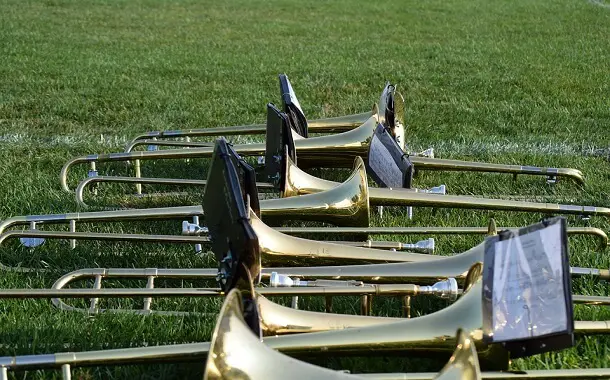The Cost of a Trombone
Last Updated on October 23, 2021
Written by CPA Alec Pow | Content Reviewed by ![]() CFA Alexander Popinker
CFA Alexander Popinker
The trombone was first invented more than six decades ago by an Italian instrument maker who became famous after creating this new item for brass band use. Trombones are a symbol of joy and celebration. They’re the only modern orchestral brass instruments that have all notes for chromatic scale, making them perfect to play at weddings.
The trombone has seen a variety of uses in different types of ensembles. They’re used by orchestras to play classical music, marching bands for displays and shows at universities or high schools to celebrate sporting events like football games, and even rockers sometimes use them as their lead instrument.
How much does a trombone cost?
The price of a trombone is influenced by many factors, including the type of the trombone, the brand, condition, and where you purchase it from. The average cost of a trombone is around $350 for a student version, while a professional brand will usually cost more than $9,500. For instance, Alto trombones can be bought for anywhere from $350 to more than $4,200 and the small-bore tenor trombones are sold for $750 to $3,800 if brand new. Also, the price of medium and large bore trombones is anywhere between $1,800 and $6,000.
In the table below you will find the price estimates for some of the most known types of trombones.
| Type | Price Range |
|---|---|
| Small Bore Tenor | $800 to $3,300 |
| Alto | $300 to $3,000 |
| Medium Bore Tenor | $2,000 to $5,000 |
| Bass | $2,500 to $6,000 |
| Baroque | $4,000 to $8,000 |
| Large Bore Symphonic Tenor |
$1,400 to $5,000 |
The market is flooded with a variety of brands, but there are some that stand out from the rest. Brands such as Holton and Yamaha tend to offer higher-end products while still maintaining affordability for students or beginners on a tight budget who may not need top-of-the-line instruments right away. Other brands include Besson, Bach, Getzen, Conn, and King. Refer to our table below to see how much one of these would cost.
| Brand | Average Cost |
|---|---|
| Yamaha | $2,000 to $3,500 |
| XO | $2,000 to $3,500+ |
| King | $2,200 to $2,700 |
| Kanstul | $2,500 to $4,200+ |
| Jupiter | $1,200 to $2,000 |
| Holton | $2,700 to $3,800 |
| Getzen | $2,200 to $4,300 |
| Conn | $2,200 to $3,800 |
| Bach | $3,000 to $5,400 |
| Antoine Courtois Paris | $3,200 to $5,400+ |
| Amati | $1,200 to $2,200 |
| Allora | $170 to $350 |
You can buy a student version trombone from the Guitar Center for only $200, while a professional bass trombone would cost you more than $7,500.
Trombone details
The world of trombones is a vast one, with many different types to choose from. However, the main types are the trigger type, the bass, and the straight one. The straight tenor is the simplest as it will not contain any tubing inside. On the other hand, the trigger trombone has an extra tubing through its main loop, resulting in a longer shape. The bass trombone is different from the first two by having a second rotor, that allows the horn’s low end to be extended. It also has a larger bore.
You might also like our articles about the cost of a saxophone, tuba, or a set of violin strings.
A trombone’s bore size, which is the diameter of its tubing is variable and affects how it’ll sound as well as its playability. Bores range from .500” to around .547” in diameter for those who want a fuller tone. The ones designated for students are smaller, with sizes anywhere between .500” and .525”
When talking about the finish, the bells can be made from yellow brass, out of which the most common are silver or red brass.
What are the extra costs?
 A trombone mouthpiece is one of the most important parts of this instrument, and those who want to play with a richer tone should upgrade or buy a new one. The cost of one can range anywhere from $40 to $200, depending upon what brand and material you choose as well as how many features it includes. Generally speaking, though if someone wants a richer tone then they will need to purchase a deeper mouthpiece. In case you purchase a used trombone, you will have to also purchase a new mouthpiece.
A trombone mouthpiece is one of the most important parts of this instrument, and those who want to play with a richer tone should upgrade or buy a new one. The cost of one can range anywhere from $40 to $200, depending upon what brand and material you choose as well as how many features it includes. Generally speaking, though if someone wants a richer tone then they will need to purchase a deeper mouthpiece. In case you purchase a used trombone, you will have to also purchase a new mouthpiece.
The price of a good, sturdy trombone case can range from $120 to $850, depending on the brand and features.
Trombones are complicated instruments. They have many parts, which means there’s a good chance you’ll need to clean some of the parts at some point. Plan on spending $8 to $35 for slide lubricant and slide oil.
In case you have your trombone shipped, expect to pay anywhere between $45 and $70 on shipping fees, depending on the retailer.
A slow and sluggish slide will need to be repaired at some point. A common repair for this type of issue is $25 to $60, but it depends on where you live in the country as prices vary from state to state or even by city or town.
If you need to take lessons, the prices are anywhere between $25 and $55 per one 60 minutes session.
How can I save money?
A used trombone might be cheaper if you find the new ones to be too expensive, but make sure it is in good condition before purchasing. If possible, test the instrument and only buy from an experienced seller who will be able to tell if something’s wrong with your purchase or not. Even though there might seem like there are plenty of cosmetic flaws on second-hand instruments they can always be fixed by refinishing metal parts according to your preferences.
Renting a trombone is an excellent way to experience the instrument before you buy it. Retailers like renting for $25 or more per month, and many allow long term rentals with no additional costs or deposits.
The lease-to-own option offers the musician more flexibility and may be an excellent alternative for those who are not sure if they want to buy or rent their instrument. Make sure you read through all terms before signing such a contract.
For beginners, consider investing in a student model and start small before buying an expensive name-brand instrument. For example, on Amazon, highly rated trombones cost anywhere between $110 and $160.


Leave a Reply
Want to join the discussion?Feel free to contribute!